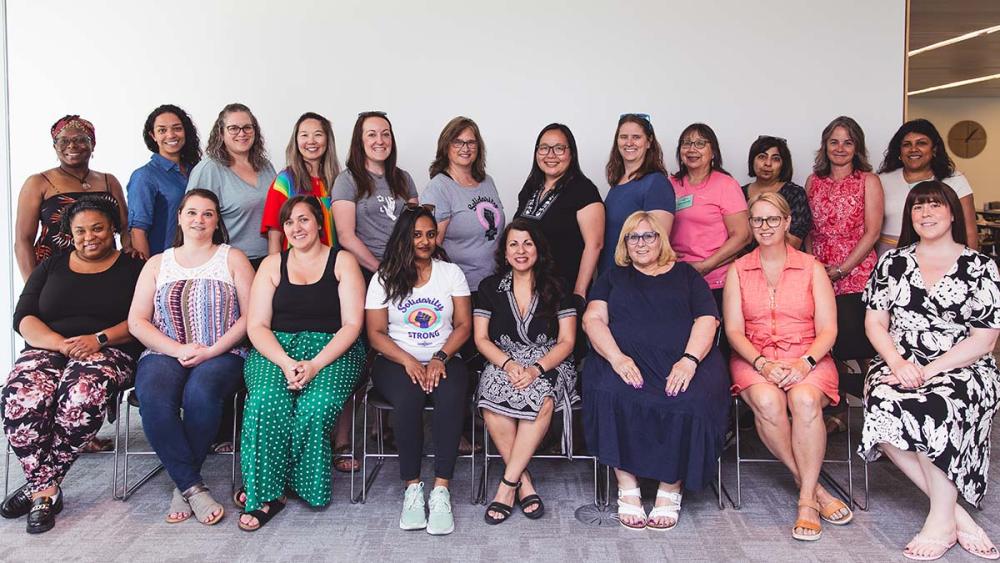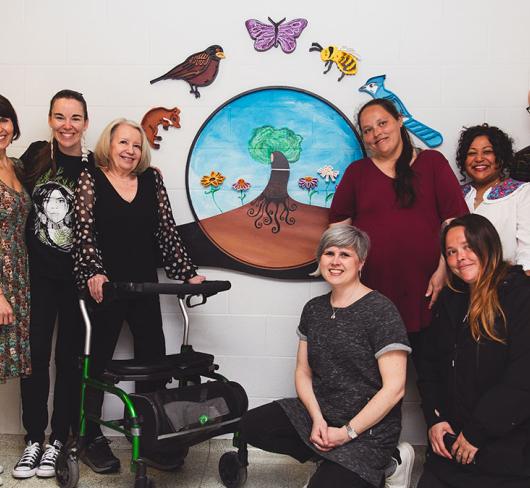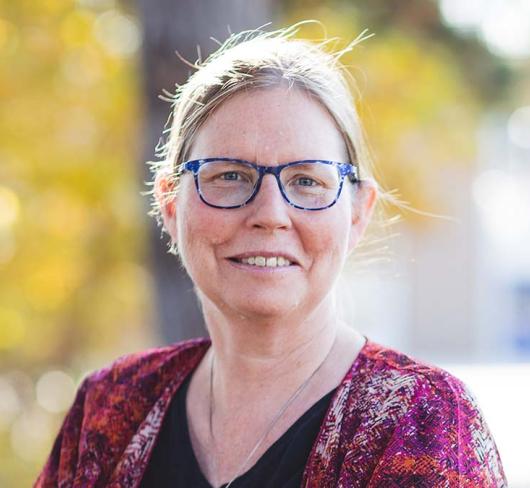
Lifting Each Other as We Rise: ETFO's Mentor Coaching Program
Closing Circle Rejection
We are sitting in a circle after our first Mentor Coaching session. The question we are considering is, “What does feminist mentorship look like, sound like and feel like?” We can each only share one word, and they fly out of our mouths with hope and excitement. Words like empowerment, laughter, honesty, humility, caring, warmth, trust, mothering, sharing, connection, acceptance, friendship, validating, belonging, knowledge and ready!
We are a diverse group of members who have joined the ETFO Mentor Coaching program as mentors and mentees. Some of us have just met and we are already building relationships that will uplift us as we move through our leadership journeys.
What is the ETFO Mentor Coaching Program?
ETFO Mentor Coaching is a two-year program for women members to develop leadership skills, build relationships and actively engage in their local and provincial union. The guiding principles of the program reflect ETFO’s ongoing commitment to antioppressive, intersectional feminism and a strong belief in the power of transformation that supports individual to systemic change.
Mentors are chosen from different locals across the province for their extensive and diverse leadership experience within the Federation. Mentees apply to the Mentor Coaching program because they want to grow their leadership skills and develop goals that will support them to take action in their own locals or at the provincial level.
The pilot for Mentor Coaching was held from 2015 to 2018. Women from the first cohort have gone on to become local presidents, chief negotiators, Executive members, provincial staff, standing committee and executive members, founders of local mentoring programs, ETFO curriculum writers, conference workshop facilitators and program panelists; Annual Meeting delegates, labour council delegates and change-makers within their communities.
They have managed to maintain their relationships through a self-organized Facebook group, meet-ups at ETFO events such as Annual Meeting, continuation of informal mentoring, supporting one another to achieve new goals, mobilization of the group for social justice actions and working together on various projects.
This year, the program welcomed its fourth cohort. I am honoured and humbled to have been one of the mentors who participated in 2021-23 and will continue for this next cycle of the program with a new group of mentees.
What is a Mentoring Culture?
As part of the program, mentors receive training on how to develop a mentoring mindset and practice, with the ongoing goal of developing a mentoring culture. Mentors participate in a variety of workshops with ETFO staff and guest speakers to explore the guiding principles. We are learning that mentoring is an invitation for growth, especially when it is rooted in intentionality, authenticity and openness.
The late Lois J. Zachary, an internationally recognized expert on mentoring and leadership, wrote about the value of mentoring relationships that strengthen the internal capacity of individuals by recognizing and honouring their unique strengths and contributions.
“Creating a mentoring culture is sacred work that connects us more deeply to one another as we take the mentoring journey that renews us individually and collectively as an educational community,” Zachary wrote in a 2006 article. “To create a mentoring culture, institutions need to use available resources wisely, while committing to do the right kind of work.”
Zachary argued that in order to establish a sustainable mentoring culture with longterm benefits, there must be a commitment to building infrastructure that includes essential components, including accountability and alignment. Accountability requires “shared intention, responsibility and ownership, a commitment to action and consistency of practice.”
The ETFO Mentor Coaching program works to put some of these ideas into practice, supporting members to formulate action-oriented goals, define roles and responsibilities, monitor progress and measure results.
Guiding Principles of Mentoring
ETFO brings an anti-oppressive framework to all of the work that we do, and actively encourages all members to approach teaching and learning through the lens of intersectional feminism. As an organization, we are holding each other accountable by developing programs and materials that are aligned to and rooted in these guiding principles.
During the Mentor Coaching program, mentors and mentees are provided opportunities to reflect on our multiple identities and to think deeply about the ways that power, privilege and positionality impact all of our relationships. We work with ETFO staff who support critical and courageous conversations about how we might be equitable, anti-oppressive and transformative in our relationships. This is essential to our work supporting students, staff and families inside and outside of our schools.
The ETFO Indigenous Women’s Mentorship Program is a new initiative that is open to members who self-identify as First Nations, Métis or Inuit. It was created in 2022 as part of the Federation’s commitment to reconciliation and justice, and in recognition of the impact that settler colonialism continues to have on Indigenous women. In her article in a recent issue of Voice, “Creating Authentic Leadership Opportunities,” Sabrina Sawyer writes about the importance of designated spaces for Indigenous members to create community and connection and includes the voices of mentors and mentees who share their own stories about the program.
Charlotte Neckoway is a mentor in both programs. She is fluent in Ojibwe and Oji/ Cree and is a leader in Indigenous education, equity and social justice. Charlotte guides and supports students, families and educators on their learning journeys with her many gifts, which include honesty, humour and humility. Charlotte describes the positive impact of reciprocal relationships and learning in community: “Last year, I had a wonderful relationship with my mentee. When I mentor, I want others to become allies for us Indigenous peoples, to share my culture and teachings with them. I also want to learn from my mentee, to have an open mind and open heart.”
Sajah Stiller served alongside Charlotte as a mentor in the Indigenous Women’s Mentorship Program for two years. “As a non-Indigenous person, it is important for me to hold space with Indigenous members, to listen with humility and find ways to put my allyship into action. It was a joy to walk alongside my mentees as they worked towards their goals, each one following their own unique path.”
Mentees
Mentees bring a curiosity and a commitment to learning and diverse leadership experience to the program. Some mentees are at the beginning of their leadership journey and want to learn more about ETFO, while others are new executive members in their local or want to explore new leadership opportunities.
After learning about the hopes and goals of the mentees and the mentors, ETFO staff thoughtfully pair us together for two years. We then establish mutual goals and determine how we will communicate with one another. ETFO releases mentors and mentees to meet throughout the year to check in and holds everyone accountable for their professional growth. One of the most exciting things about the mentor-mentee relationship is the collaborative learning that takes place. When the whole group is together, we can connect through small-group and wholegroup activities.
“I recommend the Mentor Coaching program to everyone. It was a life changing experience for me,” says mentee Kara Neufeglise. “I connected with my mentor immediately and she helped me focus on one goal at a time. She helped me become a better version of myself and encouraged me to have a better work-life balance. There were other mentors and mentees in the room that I still connect with today. This program allowed me to feel connected to myself and my union.”
Kara joined the Mentor Coaching program because they wanted to develop skills as a workshop presenter, as well as working towards the goal of teaching an ETFO additional qualifications (AQ) arts course. After attending Presenter’s Palette, Kara developed a workshop that is now available as part of Presenters on the Road and was shared at the 2024 ... and still we rise conference. Kara also co-facilitated a workshop for the ETFO Mobilizing for Justice program with their mentor.
Importance of ETFO Women's Programs
That the Mentor Coaching program is available specifically for women members is intentional. Women’s programs are an integral part of ETFO and essential to the Federation’s ongoing commitment to equity, justice and inclusion. Although women make up 81 per cent of ETFO’s membership, they are still underrepresented in leadership positions at the local and provincial levels. There are many individual challenges and systemic barriers that prevent women from achieving equality in positions of power.
Sajah is a mentor with extensive leadership experience that includes facilitating anti-racism/anti-oppression training in her board and local, curriculum development, collective bargaining, parliamentary procedure and governance, strategic planning, and community organizing.
Sajah deeply values the relationships established through women’s mentorship programs and the opportunities to work with other Black and racialized women. Currently in her third year as a mentor in the Mentor Coaching program, she has witnessed firsthand the personal and professional growth experienced by both mentees and mentors. “Community, connection and celebration are hallmarks of these authentic spaces where members are challenged to grow and find their place in our union,” she says.
Sajah describes the power of ETFO’s women’s programs: “Once you start, you can’t stop. Something awakens in us.” She also speaks to the importance of working together for two years. “This program gives you time to see your growth. It allows members to build relationships with critical friends and allies, which we all need when we are fighting against patriarchy and expectations of what it means to be a woman.”
As part of the Mentor Coaching program, there are emotional discussions about the challenges that women encounter on their leadership journeys. Women who are proactive and informed are often perceived as threats to the systems of power that uphold inequality. Some of the challenges experienced by mentors and mentees include micro-aggressions; exclusion and/or silencing by others; and systemic barriers such as sexism, racism, anti-Indigenous racism, homophobia, transphobia, ableism, and income inequality. These systemic inequities continue to prevent women from accessing leadership positions. Through the mentorship programs, we support each other by listening, questioning, and holding space to share stories and empower each other with resources and support.
Charlotte has experienced barriers to leadership that are both internal and external and is grateful for the support of ETFO’s mentoring culture. “Imposter syndrome is real. I’ve had to fight the lies that I couldn’t be a mentor/leader, but slowly I am overcoming that lie about myself,” she says. “I have stood up to racism and discrimination as a teacher – I keep fighting it. When I face obstacles, I seek out help from friends and other mentors/ teachers I have come to know through networking.”
Charlotte got involved because she felt it was time to give back. “Over the years, I have received so much from ETFO events. It is time to extend those teachings to others. I also want other Indigenous women to get involved and I am still trying to lead the ones I know in that direction. It takes time to leave your comfort zone.”
Why is this Program So Important?
At the end of this two-year program, there is a graduation ceremony to honour the mentees and their accomplishments. Special guests are invited to hear about the impact of this important women’s leadership program, and everyone is acknowledged and celebrated for their roles in creating a strong community of care and respect.
As we listen to each other, it is clear that it is not just the mentees who have grown. The mentors have also experienced personal and professional growth. “I love that I can share my heart and thoughts openly with others. I could never do that before,” says Charlotte, “I share my love and care to other mentors and mentees in the group. I have grown in my leadership skills, I am more brave, more outspoken, and also more understanding.”
As I reflect on my own journey as a mentor, I am proud that I am using my power to empower others. I am grateful for the ongoing support of ETFO members and the shared commitment to lift each other as we rise.
Mentoring is a powerful way to build reciprocal relationships that are collaborative and focused on taking action. It is essential at all stages of our careers, and can help us connect with ourselves, our strengths and our supports. A mentoring culture holds us accountable to our shared goals of antioppression and intersectional feminism. It encourages transformation and moves us from individual to systemic change. Mentoring gives us the courage to lead and the hope that we need to co-create the just futures that we want.
Velvet Lacasse is a member of the Kawartha Pine Ridge Teacher Local.

